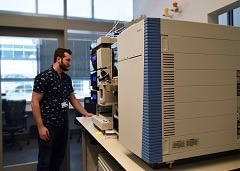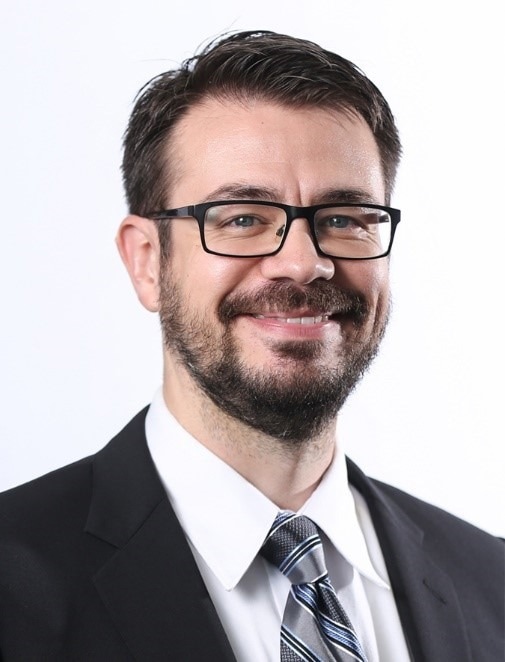Can you provide an overview of mass spectrometry?
Mass spectrometry is a technique that allows us to measure the mass of individual particles and molecules. A mass spectrometer instrument generates an isotopic signature, a kind of fingerprint, that can identify compounds and their structure. This means you can take complex samples, like blood, soil, a hotdog, a plant, or almost anything, and discover what it is made of at the molecular level.
This may sound relatively simple, but when you start applying this technology to scientific questions in many different fields, it becomes clear that it is very powerful.
How has this field grown over the past decade?
Mass spectrometry has reached a point where it is robust enough to unlock new capabilities in many fields. For example, NASA’s new Artemis Space Program has a mass spectrometer, MSolo, that can operate in space and will be used to identify molecules on the moon's surface. New innovative instrumentation is sensitive enough to detect biomarkers in a blood spot on a postcard that can be mailed to the lab so that patients who live far from a hospital can be remotely monitored. With computational breakthroughs like AI and machine learning, the big data generated by massive mass spectrometry screens can reveal novel drug targets to treat diseases. The field continues to grow rapidly, which opens up new opportunities to advance areas of discovery.
In which fields of science is mass spectrometry most useful?
Mass spectrometry is most useful in biomedical research. Mass spectrometry is critical to many areas, such as Environmental Science, Food Science, Forensic Science, Pharma, and even newer areas of rapid growth like the cannabis industry.
Mass spectrometry allows scientists in these areas to look deeper into a sample than ever before to identify soil contaminants, the optimal strain of cacao, the presence of a drug in a drink, or the structure of a new drug. It is less about which field it is most beneficial to and more about the wide breadth of fields that training in mass spectrometry can open.

Image Credit: Loyola University Chicago
Can you explain what the aims of the Master of Science in Clinical and Applied Mass Spectrometry (CAMS MS) Program are?
As the use of mass spectrometers continues to grow, many labs, industries, and hospitals have realized that while it is easy to buy a mass spectrometer, it is challenging to find someone to run it. The traditional training models significantly cause this shortage of mass spectrometrists. Scientists have only been able to learn about mass spectrometry by earning a Ph.D. in a mass spec lab or learning on the job. These options are time-consuming and keep the number of scientists trained in mass spectrometry very low.
CAMS-MS aims to train students in one year on how a mass spectrometer works, how to use one, and how to design a mass spectrometer experiment. Students will receive both theoretical background and technical hands-on experience. The goal is that after one year in the CAMS program, students will be able to be employed in a mass spec position.
Who is this program targeted towards?
CAMS is a hybrid, flexible program. The didactic classes are interactive online courses that students can work into their schedules. These classes involve virtual interaction with the faculty on the student’s terms. The two hands-on lab experiences are intensive three-week rotations with multiple scheduling options throughout the year.
CAMS is thus designed for almost anyone, including undergraduates looking to specialize in a high-paying science career, industry veterans hoping to move into an exciting and growing field, international students that want to take advantage of global industry opportunities, and many others.
How unique is this course, and what does it offer that other master's programs do not?
This is the first program to specifically offer training in mass spectrometry. Other MS programs tend to offer broader education in biotechnology or similar fields. These are great options, but they fail to prepare their students for a specific technical field such as mass spectrometry. Moreover, as MS technology is used across so many areas of science and industry, our specialized program provides many opportunities for students to pursue.
Why is this the right time for a program like this?
There is great demand out there for scientists trained in mass spectrometry. The technology and instrumentation are mature, and many fields have recognized the power and potential of mass spectrometry. Thus, the timing for CAMS is perfect for two reasons. First, the demand for trained mass spectrometry scientists means our program can prepare students for an immediate career. Second, mass spec technology is a cutting-edge approach in science, and the frontier is an exciting place to be.
Can you explain some of the benefits graduates will take away from the course?
This is not just a technical certificate program; this is an academic master's degree. Students will learn foundational physics and chemistry to understand how and why a mass spectrometer works. In addition, students will participate in a capstone project with a faculty mentor and clinical collaborator to develop their own cutting-edge project.
They will also get intensive hands-on small group experience using the newest mass spectrometers available. They will prepare samples, run the instrument, analyze the data, and interpret the results. This combination of courses, capstone, and hands-on experience will prepare students for the exciting mass spectrometry field.
Can you describe some of the hands-on experience via operational training that the program delivers?
Students will be able to work directly with the newest mass spectrometers available on the market. We offer class sizes of only five students so that each gets individualized training and opportunities to perform mass spectrometry experiments from beginning to end. Students will also learn troubleshooting and simple repairs to the mass specs. These flexible yet intense hands-on training experiences, led by a mass spectrometrist with over a quarter century of experience, will directly prepare students for their future careers in the field.
Why may science graduates and those already working in the field of scientific research need this boost to advance their careers in the field of mass spectrometry?
Modern science is almost overwhelmingly complex. To make important discoveries, scientists must work as part of a team, where each member is an expert in one piece of the project. Thus, specialization and developing expertise are critical for modern scientists. Furthermore, mass spectrometry is a rapidly growing field that offers cutting-edge opportunities. CAMS is an excellent chance for current scientists to add new techniques to their skillset and open new fields and industries in which to work.
What are some challenges facing the mass spectrometry field, and how could this course help graduates face and overcome these?
The biggest challenges are the shortage of scientists trained in mass spectrometry, which this program was developed to address. Furthermore, as mass spectrometry grows more powerful, the datasets become more massive. How to derive knowledge and insight out of “big data” is thus a pressing challenge in the field. CAMS students will receive training in the analysis and bioinformatics of mass spectrometry. They will be key players in the teams developing next-generation AI and machine learning platforms to analyze these datasets.
What are your current research projects?
My lab uses mass spectrometry to understand what happens to patients with cardiovascular disease at the molecular level. The technology reveals mechanisms that drive heart failure, diabetes, arrhythmias, and other all-too-common diseases in the world. With this information, we can discover new drug targets that could help reduce mortality.
Could you describe how mass spectrometry has shaped your research?
For my research, the most exciting thing about mass spectrometry is the power of discovery. I can take a sample from a specific disease, and the mass spec can tell me all the molecules that differentiate between diseased and healthy tissue. We may not even have names for some of those molecules yet. This scientific discovery allows us to follow entirely new investigation tracks.
About Dr. Jonathan Kirk
Dr. Jonathan Kirk is the director of the Clinical and Applied Mass Spectrometry Master of Science program at Loyola University. Dr. Kirk began working at Loyola in 2015 as part of the Physiology department and quickly emerged as a leader when it came to identifying the educational needs of students.
Having studied Bioengineering at Washington State University and University of Pittsburgh, he went on to complete his Postdoc at Johns Hopkins School of Medicine where he trained in Mass Spectrometry with Dr. Jennifer Van Eyk. Since that time, Dr. Kirk has continued to develop his expertise in Mass Spectrometry and was one of the primary parties responsible for identifying the significant lack of proper education for those who want to work in this exciting scientific field.
Throughout his life, Dr. Kirk has been a natural problem solver. Since childhood he has loved solving puzzles and pursuing education and that is a large part of what has brought him to become the architect of America’s first dedicated Master’s program in Mass Spectrometry - especially one that offers so much flexibility and individualized mentoring for the students.
When asked, Dr. Kirk said that the best advice for students is “Failure is temporary, success is cumulative.”
About Loyola University Chicago Health Sciences Campus
Loyola University Chicago's Health Sciences Campus is comprised of about 980 faculty members and more than 2,200 students committed to excellence in health sciences education, practice, and research.
Our mission is to advance the University's commitment to a socially just world by developing health care leaders and improving human health through education and research grounded in Jesuit, Catholic values. We expect our graduates to lead lives of consequence in the spirit of the Jesuit's call to become women and men for others, especially for those most in need.
Our campus is comprised of many different departments, institutes, centers, and schools. And we are only as strong as each of our individual parts. All of our units, including the Stritch School of Medicine, Niehoff School of Nursing, Parkinson School of Health Sciences and Public Health, biomedical programs of The Graduate School, and our health sciences research enterprise, must work collectively to move forward in the ever-changing higher education, research, and health care landscapes.
We cannot enhance our position without our clinical partners at the Loyola University Health System and Trinity Health. This partnership allows our students to learn under the expertise of physicians who deliver compassionate and uncompromising care. It also brings our education and research to the point of care and allows us to be at the leading edge of science and health care research.
Our research enterprise, which occupies the 225,000-square-foot Center for Translational Research and Education, focuses on new discoveries and improving health with an emphasis on eliminating health disparities. Working collaboratively, we will train health care leaders and researchers who are capable of and committed to the Jesuit tradition of cura personalis – care of the whole person.